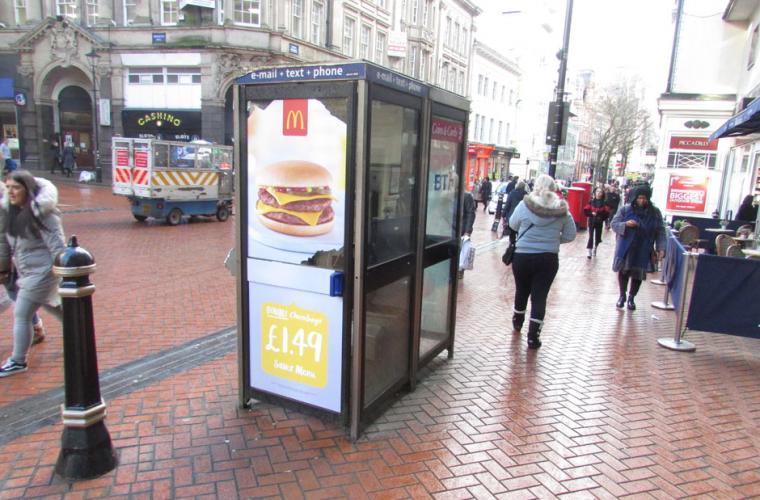Trojan telephone boxes are being used to “smuggle” advertising on to high streets across the country, with some areas experiencing an increase in applications of more than 900 per cent in two years, councils warn today.
The LGA, which represents 370 councils in England and Wales, says the Government needs to scrap the permitted development right which enables companies to install telephone boxes without planning permission.
A change in the law would give councils greater controls over the excessive numbers appearing on high streets, which are in many cases, little more than advertising billboards.
The LGA says the existing legislation is out-of-date and was made for a “pre-digital” era before mobile phones became widely used.
Under the current law, companies only need a licence from Ofcom to install a telephone box. Councils can object based on design and appearance but in cases where the applicant appeals, the final decision would be made by the Planning Inspectorate.
Councils say that telephone boxes are being increasingly used as advertising boards, rather than for their original purpose of being a place to make a phone call, and are becoming an “eyesore” to residents.
A sample of 12 council areas by the LGA shows a combined rise of 927 per cent in applications for telephone kiosks under permitted development rules between 2015 and 2017.
- Newcastle had 95 applications for new boxes in 2017 compared with 1 in 2015.
- Westminster received 180 applications in 2017 compared with 13 in 2015.
- Birmingham had 95 in 2017 compared with 10 in 2015.
- Liverpool had 97 in 2017 compared with 10 in 2015.
- Lambeth had 71 in 2017 compared with 1 in 2015.
As well as advertising, councils have seen telephone boxes fall victim to anti-social behaviour, fly-posting and graffiti. When telephones are out of use, councils are powerless to remove them.
Cllr Martin Tett, the LGA’s Planning spokesman, said:
“The rise of the smartphone and digital age has seen the telephone box become a largely obsolete relic of a bygone era.
“While there is still a limited need for some telephone boxes in our town centres and cities, for example for emergencies, the number of applications councils have seen is simply staggering.
“Companies are exploiting a loophole in the law to allow what is tantamount to Trojan telephone boxes being used as advertising spaces rather than the original purpose of providing a place for people to use a phone.
“As a result pedestrians are being bombarded with a series of eyesores that blight the public highway.
“Councils are currently powerless to act, so we want the Government to overturn the existing out-of-date legislation and give local authorities the ability to take action where this is an issue.”
Notes
- LGA analysis into the number of applications to install telephone boxes under permitted development rules
| |
2015
|
2016
|
2017
|
|
Newcastle
|
1
|
19
|
95
|
|
Kensington & Chelsea
|
13
|
15
|
97
|
|
Birmingham
|
10
|
0
|
95
|
|
Leicester
|
1
|
0
|
10
|
|
Bristol
|
1
|
3
|
28
|
|
Liverpool
|
10
|
17
|
97
|
|
Leeds
|
21
|
20
|
96
|
|
Westminster
|
13
|
45
|
180
|
|
Lambeth
|
1
|
1
|
71
|
|
Nottingham
|
8
|
0
|
20
|
|
Manchester
|
10
|
12
|
89
|
|
Richmond
|
0
|
5
|
36
|
| |
89
|
137
|
914
|
- Electronic Communications Code
- Relevant permitted development rights legislation
- Guidance on deemed (automatic) consent for advertising on telephone kiosks
- Our previous call for permitted development to be scrapped: one in 10 new homes was converted from an office

